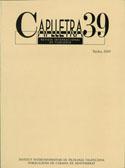Del present imperfecte i dels futurs de probabilitat, o entorn de la filologia, la lingüística, l'anàlisi crítica del discurs i les ciències de la comunicació
DOI:
https://doi.org/10.7203/caplletra.39.4854Paraules clau:
philology, linguistics, communication sciences, critical discourse analysis Resum
Resum
What is the aim today of talking about philology, either in absolute terms or related to other concepts such as linguistics or language sciences? On the one hand, it seems unfair to resort to metaphors that pair (traditional) philology and (textual) necrophilia. On the other hand, turning our back on the reality is not the appropriate response to current problems: a more applied training (in the professional field) is
needed, and (in the scientific context) the frontiers should be pushed back, because the old ones are obsolete and in need of reappraisal. Faced with a past and a present that are inevitably imperfect, this article is a reflection on the chances of a future in which philology (in the classical sense) is accompanied by language and communication sciences. The reason for this situation and for this specific proposal is not simply to follow the fashion or to embrace modernity, as the winner of the debate with antiquity: the aim is to try to provide a fuller professional training (a less erudite one) and a more interdisciplinary, less localist area of study.
The context of the article is provided by comment on a brief series of sociopolitical and cultural events in our setting, all of them previous to the elections to the Parliament of Catalonia in November 2006. Any analysis of events of this kind, even
the most superficial, shows that philologists or linguists should not undervalue a critical competence which, in its turn, should be transmitted to students as one of the skills involved in the processes of teaching, learning and knowledge transfer.
Instead of limiting itself to the fields of grammar and history of literature, an imaginative (not imaginary) philology need to be open to criticism and communication. If the natural epistemological context of philology (of any philology) is also that of communication, we should not object to the efforts to strengthen the lines of convergence rather than divergence and contrast. Can a philology without communication produce
anything but unemployable professionals? A clever (indirect) answer: although we may only be a fully-fledged nation in the preamble (not in the text) we should try hard to rescue our philology from the twilight zone.
 Descàrregues
Descàrregues
Descàrregues
Publicades
Com citar
-
Resum448
-
PDF122
Número
Secció
Llicència
L’autor o autora que adrece un treball a la redacció de Caplletra perquè siga publicat ha de ser la persona titular legítima dels drets d'explotació. La legitimació per a la publicació del treball ha d’incloure també les imatges, les taules, els gràfics i altres materials que puguen complementar el text, amb independència de si n'és l'autor o autora.
Copyright. Quan publica el treball en la revista, l'autor o autora cedeix a Caplletra. Revista Internacional de Filologia els drets d'explotació (reproducció, distribució i comunicació pública), tant per a l'edició impresa en paper com per a la versió electrònica, que serà accessible mitjançant la xarxa Internet.
Tots els treballs publicats en Caplletra es troben sota una llicència Creative Commons del tipus Reconeixement-NoComercial-SenseObraDerivada 4.0.
RESPONSABILITAT
Caplletra. Revista Internacional de Filologia no s'identifica necessàriament amb els punts de vista mantinguts en els treballs que publica.
Caplletra. Revista Internacional de Filologia declina tota responsabilitat derivada de qualsevol vulneració eventual dels drets de propietat intel·lectual que poguera ser duta a terme pels autors o autores.






